

Stevens Arnoux on a bus of Haitian-American deportees arriving at the Toussaint Louverture International Airport in Port-au-Prince in March 2014. He displays his tattoo, which says “100% Haitian 1804.”
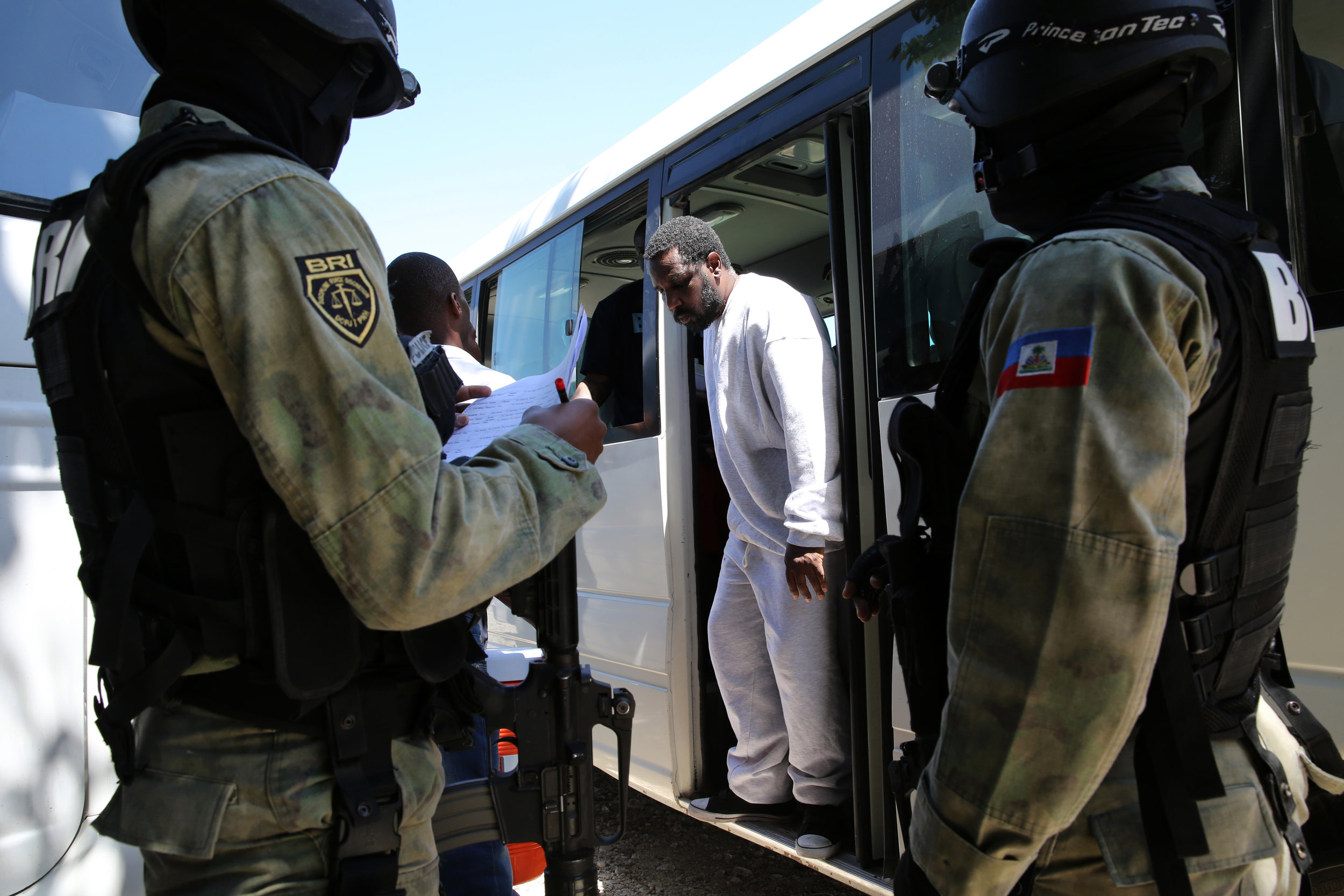
A Haitian-American deportee is escorted off to Haitian officials to gather his belongings and be issued an identification card.
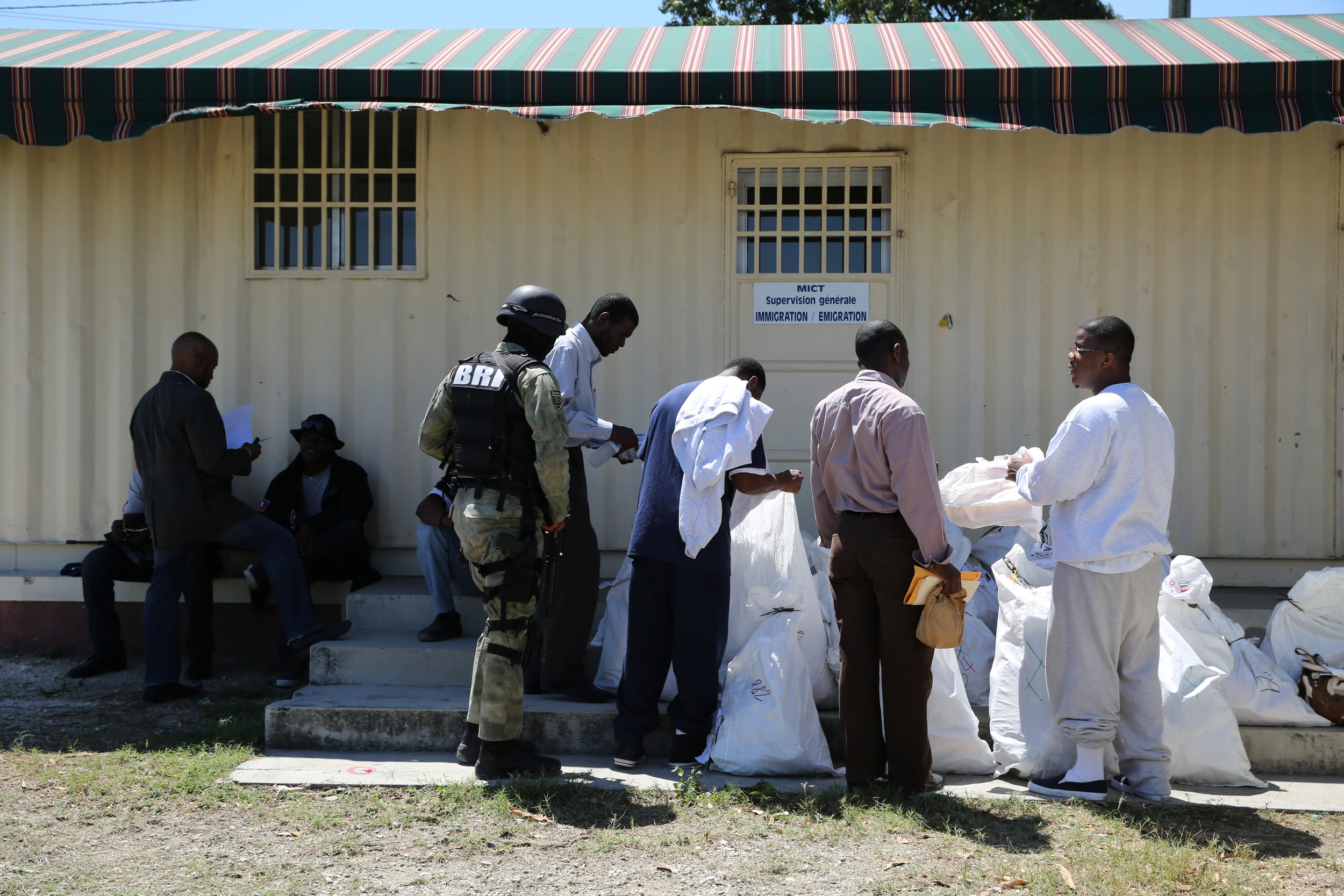
Deportees gather their belongings.

Upon air arrival in Port-au-Prince, deportee, Stevenson Dorce has been bused to a section of the airport where he is greeted by Haitian officials.


Haitian-American deportees gather outside of the accommodation center after being kicked out over an issue with the television remote control. They plan on staying with Gerard Faublas (orange shirt), a deportee who was able to receive financial assistance for an apartment before organizations that helped deportees lost funding.
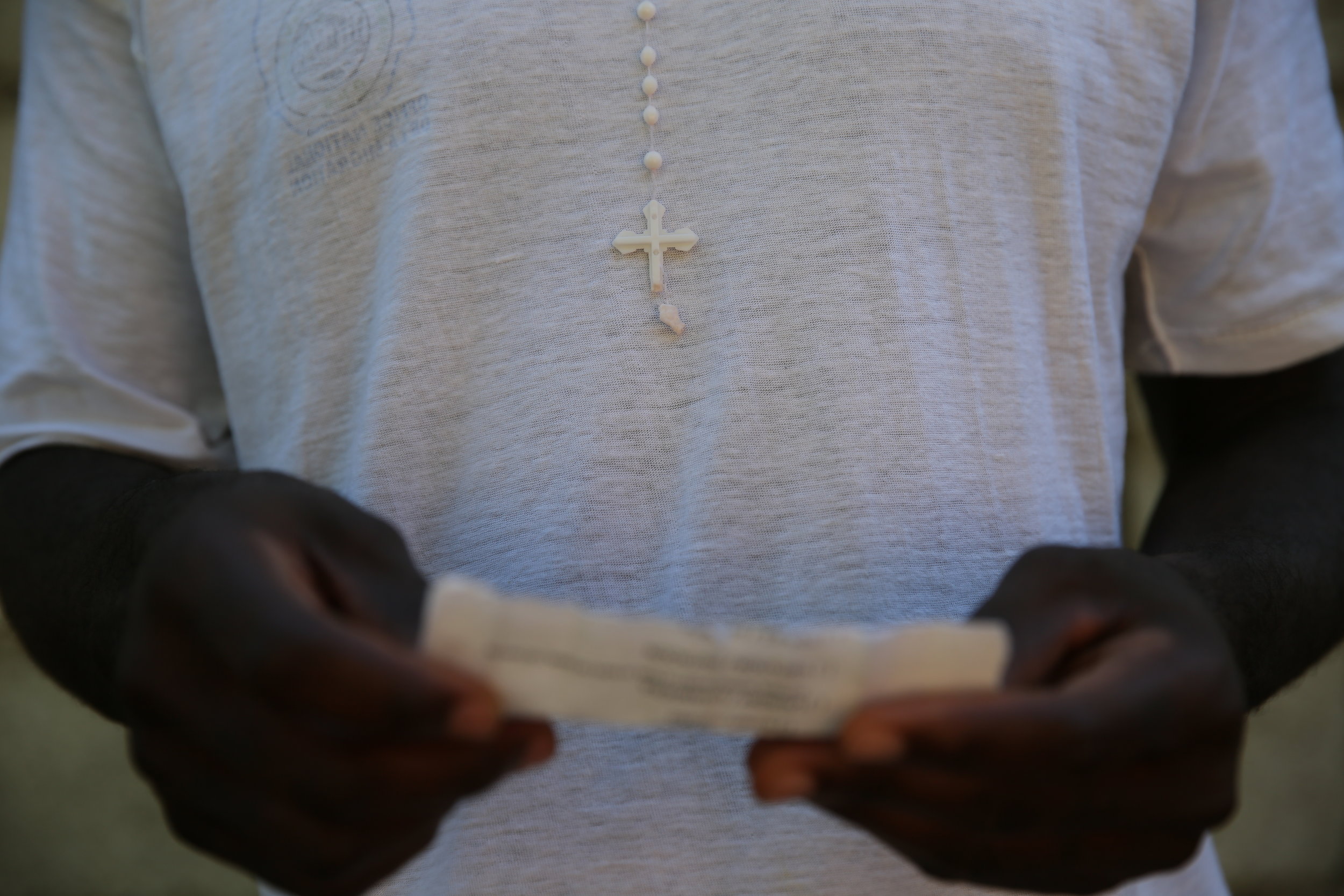
Johnnie Grandjean was born in the Bahamas to Haitian parents. He moved to Miami, Florida when he was five years old. He has two children living in Florida. Johnnie looks at a piece of paper with some phone numbers of estranged family members in Haiti at the accommodation center after his first week of arrival in Haiti. “I have a cousin in Miami working on trying to locate my people in Haiti. The security guy here has a phone, but I don’t have much money. I came down here with five dollars. For three days, I’ve been eating off of that five dollars. I worry about the worst thing that could happen if I don’t get in contact with my people. Right now, I’m living for the moment and praying for the future. I know I left many memories and people behind, but life goes on. I have to survive down here so that I can come across my family. I have come to a point of transition where I am leaving behind all the past, all the violence and all of the bad things. Life in America was kind of rough. My momma died and my daddy was never there, so I had to grow up tough. It’s been a long ride.”
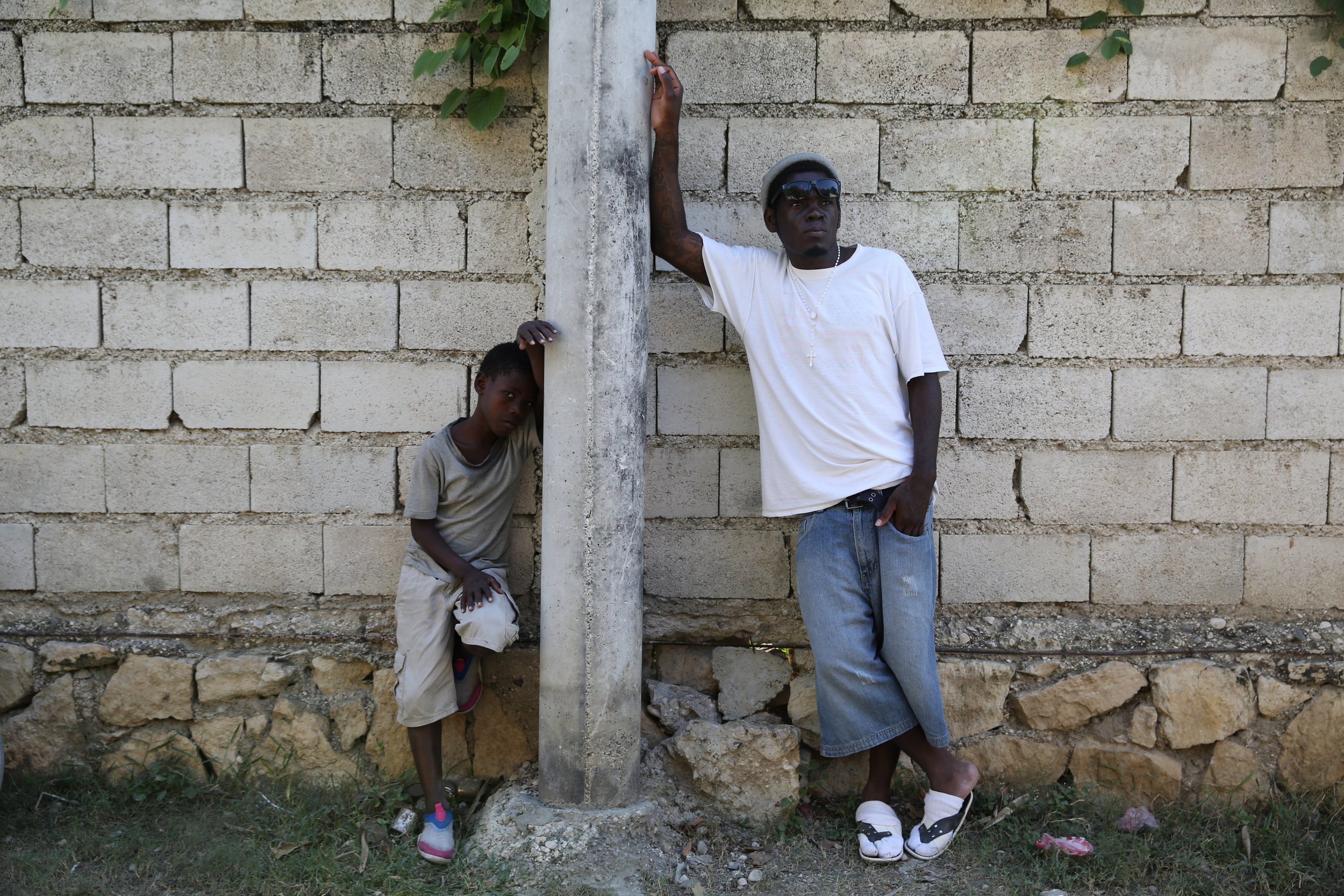
Johnnie Grandjean stands outside of the accommodation center with a neighbor. “I did three years in prison and six months in immigration. Since I got deported, it’s good to be in freedom so I could finally see the sun rise and be our and about doing what I want to do to get myself together and better my life.”

Deportees outside of the accommodation center.


Frantz Lafaille is 36 years old. He was born in Haiti and raised in Brooklyn, New York. He was sent back to Haiti in 2009 after a drug charge. He began using drugs to cope with a deep depression after being separated from his wife. After a brief time in prison, he put himself through a drug program and then got deported to Haiti. A year after his deportation, he survived the earthquake in Port-au-Prince. The house he was living in with his grandmother collapsed and luckily, they were both outside. A year later, he began working at a restaurant called La Maison where he made connections with volunteers involved with orphanages.

Eventually, Frantz partnered with other volunteers and created an organization called "Future for the Kids." "I have two beautiful kids. Because with my own kids in the States, that really pushed me more to use Future for the Kids to support the kids here."

“I am Baltasars Romilus. I spent so many years in prison for conspiracy for a thing I didn't do. I was in a drug conspiracy. By the time I finished my time, everything I had disappeared after 18 years. My house disappeared, my wife remarried, my kids gone with the step-daddy. So I don't even have money to get a decent lawyer to fight my (deportation) case. We as deportees look like we come from another planet. Even your own Haitian people downgrade you because you are a deportee. The government ain't do nothing to stop it, to make us feel like we're welcome home. People ignore you, people degrade you. They think every deportee is a criminal. I'm not a criminal. They got me for selling drugs. But you know, for Haitians, they don't know if you killed somebody or raped somebody. They look at us as rapists and killers. That's what they title us here. I never lost hope. I always hope a great thing one day comes."

“My name is Moise William. I was removed from the United States to Haiti on January 20, 2011. The transition was really difficult. I have a family back in the United States. A wife, three kids, all of which are American born citizens. It’s difficult leaving them behind. I'm out in haiti, serving the community through a business by selling treated water. I am an upstanding citizen out here. I really miss the United States and I miss my children and my wife.”

“My name is Jesula Nicolas. I’m from Haiti. Three years old when I came to America. I have 8 kids. One died. The reason I’m here; My first baby daddy used to abuse me and one day I was fed up and I picked up a knife and I cut him. They charged me with battery with a deadly weapon. They gave me five years probation. I’m doing the probation and one day my probation officer told me to come to his office and immigration was there. I had a case for two years. I lost the case. They sent me here. I know I did something wrong but the punishment is too much. I left my kids. I left the life I knew since I was 12 years old. And you just send me to a country I don’t know nothing about. I don’t have nobody to go home to. nobody to cry to, and I have to do everything for myself. I have kids in another country. And it’s not right. A mother should not leave their kids behind. Living here without my kids; it’s like living with half my heart dying. Ain’t nobody calling me mama. Ain’t nobody for me to kiss. Ain’t nobody there for me to hug. Ain’t nobody there to hug me. You know? And to me, it’s like they’re killing me slowly. I’m in a country...nobody, no mama, no daddy, no grandma, no brother. Nobody. When you’re a woman and you’ve been beat up like I’ve been for so long and you defend yourself, you pay double. I paying with my life, I paying with my children’s life. And he’s still there where he’s at, beating on the next woman. But me, I’m paying for it. I don’t even have clothes on my body. People have to give me clothes. I’m sick. I can’t get my medicine. I dont have the money to get the medicine and there is nobody I can go to. And I don’t think it’s fair. I really think it’s not fair to me.”

“My name is Walter Larose. I just got deported to Haiti and I am adjusting to the atmosphere and all of the circumstances. It’s rough right now, but I’ll survive and everything. Another day, another mission. I’m 23. I was born in Haiti. I moved to the States when I was eight years old. I didn’t really know Haiti. All I knew was the States. My brother is the only blood I have over here. He recently came, three months after me. That was another deportation. I was originally living in Orlando, Florida. Some people call that Disney World. I had a father. He’s the one that brought us to the States, but a year and a half after, he ended up dying. My mother already died when I was 3, so both my mom and dad had passed away. I have two sisters, one brother. We ended up living with my sister. She was only 14 at the time. She had somebody that took her in, so they took all of us in. I remember life was hard for us with no mom and dad. We had to figure out a way to live and survive. From having no job to making the wrong decisions, one thing lead to another and I went to the streets. That’s when everything started falling apart. And you know, that lead me to juvie. I went back and forth to jail. I was like a juvenile with no adults to direct my path. I went to prison and then I came here, somewhere I don't even know. I don’t have any family here. I am basically living everyday trying to find something to do with no job. The government ain't giving no aid. And to tell you the truth, I heard from a lot of people that if you don't know the conditions of this, you can go crazy, like totally mentally crazy. It’s rough over here. It’s even rough for animals over here. When I got deported, I didn't even know where I was gonna stay, who I was gonna stay with. I thought I was gonna be on the streets with no family, nobody to call. I was a stranger to a place that I was born in. My sisters are still in Florida. One of them has been helping me. Without family, I'm dead. I thank god that she’s always been there for me. She’s like a mother to me.”


Carmeline Nazaire (left) was deported in April 2012. Though she was lucky enough to get a job with a water mission organization, she still struggles to adjust to Haiti. She has three kids living in Florida with her sisters and her mother (right). Her kids are 17, 13 and 11 years old. They miss their mother and keep in touch through Facebook and the telephone. They try to make her proud by doing well in school. However, it has been financially difficult for her sisters and mother to take on the financial responsibility of taking care of the kids.

Jean Montrevil (left), an immigration activist, was deported to Haiti in January 2018. He speaks with his daughter, Jamya in New York City as his ex-wife and friend, Jani Cauthen looks on.

Marie Rene Caze (left) lived in the United States for 28 years. When she was in her 30’s, she became involved with the wrong crowd and had a case against her involving drugs. She is now 60 years old and was deported to Haiti in September 2012 after attempting to visit her native country. Customs did not allow her to come back to the U.S. with a record. Marie Rene’s daughter, Love (Right) calls her mother from her dorm room in Connecticut. Love says her mother is her best friend and she constantly misses her.

Charles Pinette and his brother, Jean Jude Pinette (left) hug at a private mental health facility in Port-au-Prince where Charles lives. Charles is angry with his family for making him stay at the facility after his deportation, but the family insists it is the safest place for Charles’ condition. Charles and Jean Jude’s mother, Anne Marie Pinette (right) lives in Florida and worries for her son’s well being.
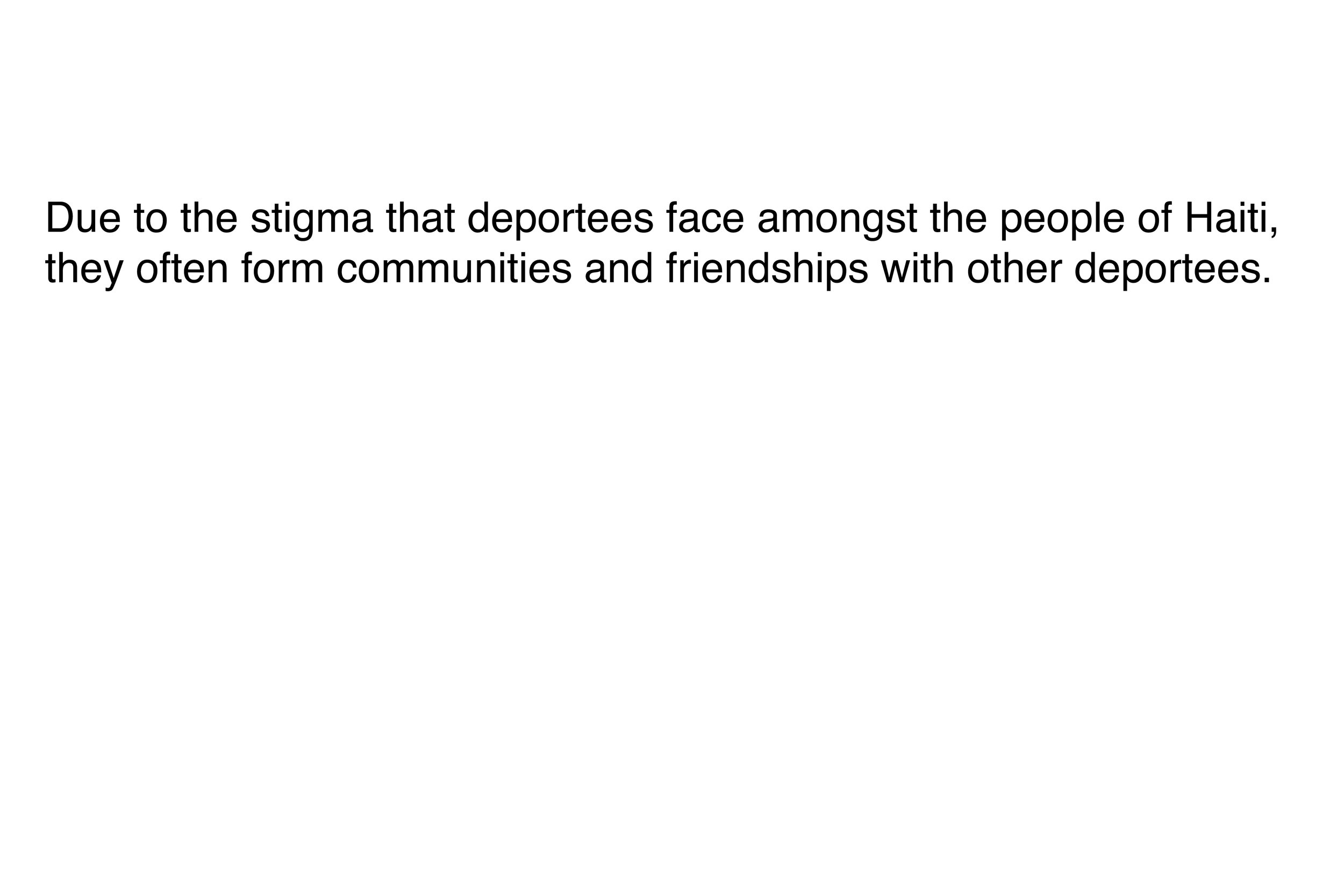

In the Delmas 33 section of Port-au-Prince, a group of deportees in a media group called “33rd Side” helped arrange a mural and wake for a man in the neighborhood that was killed by gun violence for unknown reasons. This group believes in the importance of the community.

People of the Delmas 33 neighborhood in Port-au-Prince gathers for a wake organized by the deportee community.

Toto, OG and BK are deportees that have created family amongst each other. They have all been in Haiti for several years. Toto and BK have families and wives in Haiti. They all struggle to work, but when they do, they support each other.

BK and Toto with Toto’s daughter. Toto was deported in 2006. After the earthquake, he lived in a tent with his wife and children for many years. He is finally able to rent out a room. “Coming back to Haiti was a big change for me. But now, I have two beautiful daughters. That changed my whole life.”
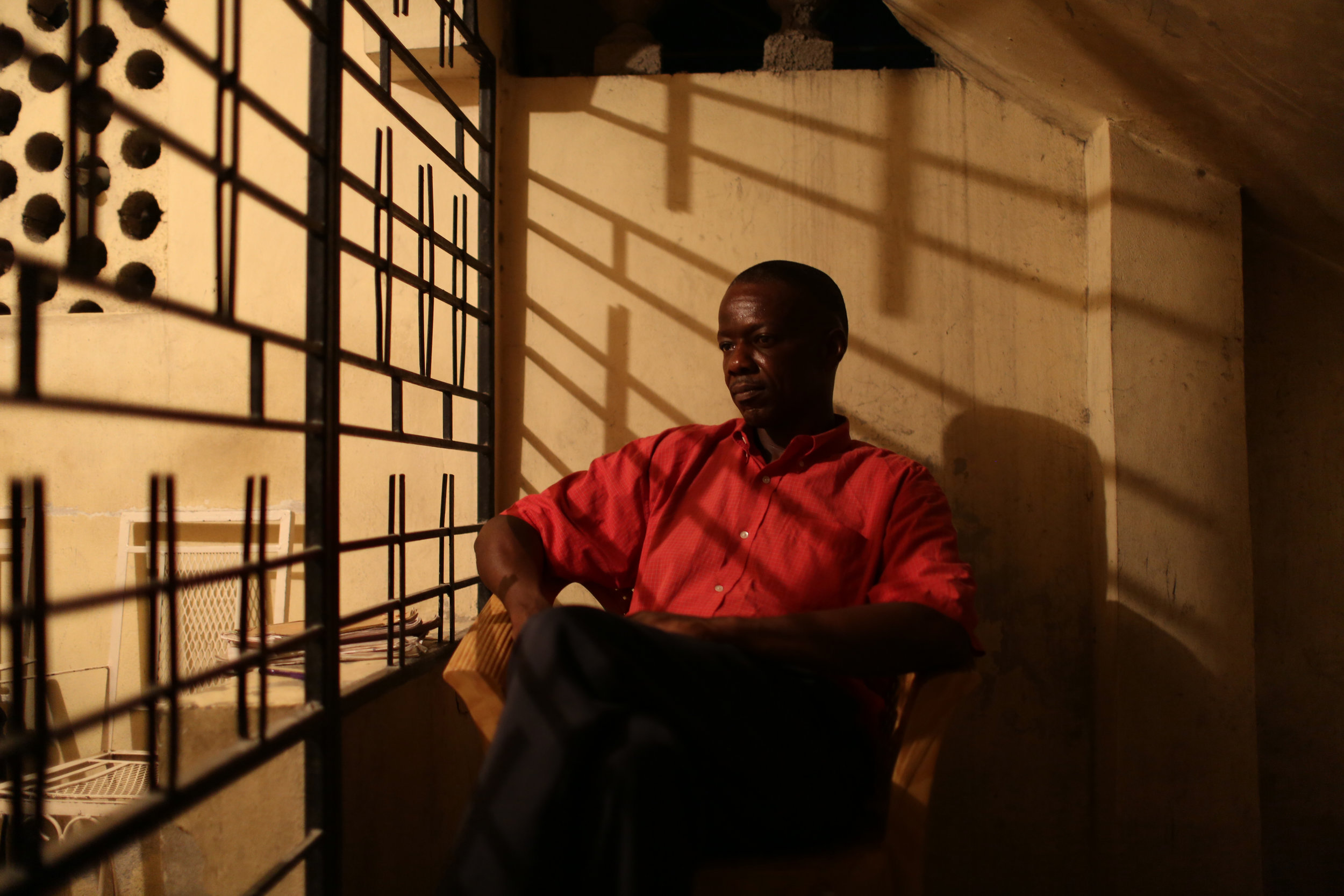
Frantz Pierre "OG": "When I was living in America, I was the type of guy that didn’t have. My family, my mother, my father; they worked every day. I took care of my brothers and my sisters. The thing is, I did good by taking care of them. My six brothers and my one sister, I took care of them. I made sure they ate. My father and my mother worked. I took care of the kids. I took them to school; I ironed their clothes; I washed their clothes. I did everything for them because my mother and father was working. When I did go to the streets, that meant I made sure my brother and sister ate. I made sure my father and mother had extra. When they provided, they still had extra because I am the oldest and I provide for everyone. I have one brother here in this country and I’m going to provide for him 'til the day I die. I’m not ever going to steal and I’m not never going to rob. All I can do is survive in a country that I don’t have no understanding of. I am a guy that you can put through anything and I’m going to adjust. But when you have to adjust in a place that you’ve never been, it’s very hard. So you have to make the best of it, no matter what."
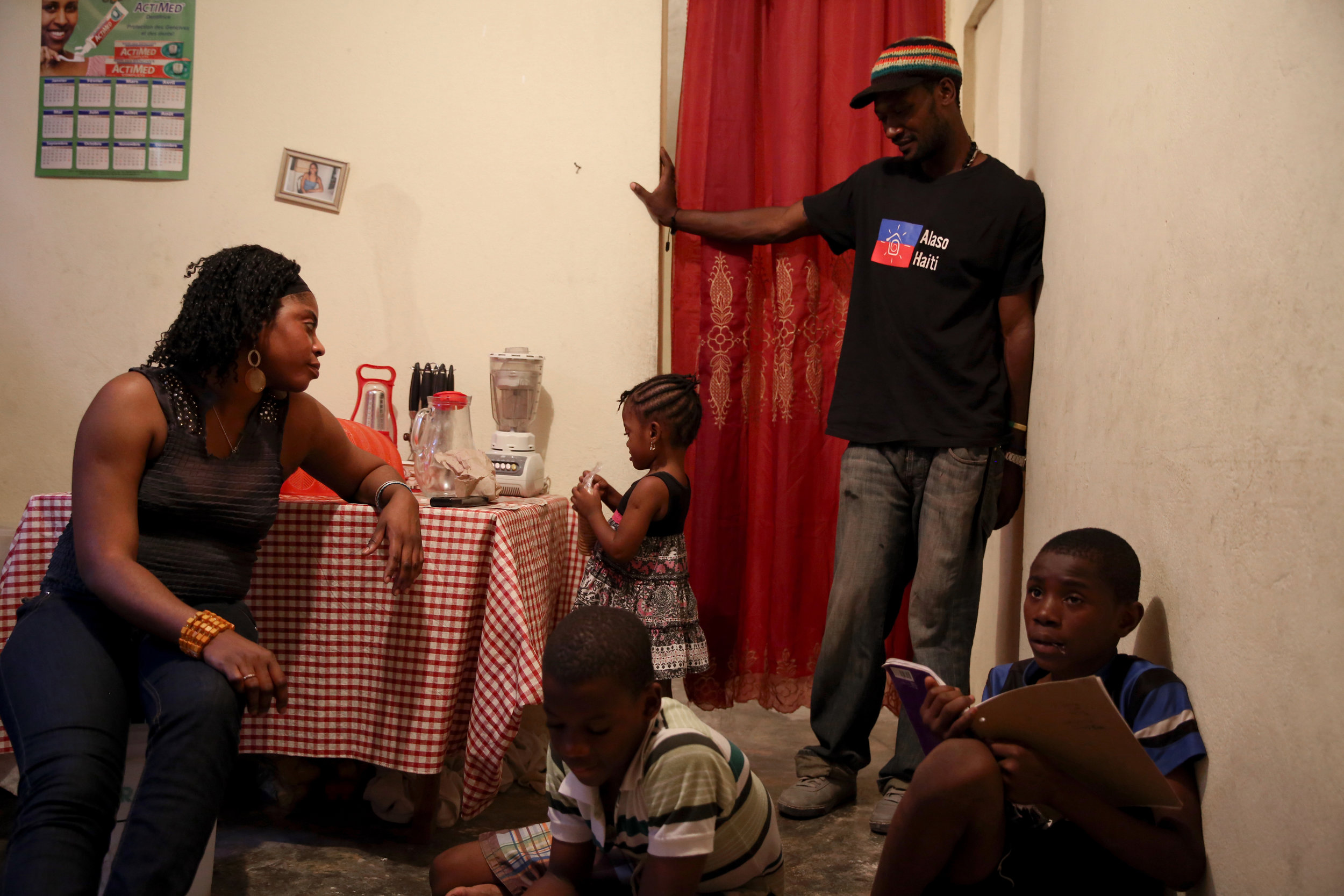
“My name is Waquan Extra Baptiste. My friends call me BK. I’m a deportee from Brooklyn, New York. I left Haiti when I was three years old. I came back at 24 years old in 2004. When I first got deported, I was incarcerated for about three months. It was horrible. It wasn’t like a regular prison in the States where you were getting three meals a day. If you didn’t have a family, you were basically sleeping on a concrete floor. It was hell. At that time, you had to pay to get released. So we payed $5000 to get released…US dollars. My mother came down and she got me out. After the earthquake, that’s when life started getting real hard and hectic; where now you don’t have no water, no food, nowhere to live. You live in a camp, where if it rains, there is mud everywhere. You have people dying, people stealing from you, people cutting up your tent and that’s not no life that nobody would like to live. Haiti’s just real hard. God-willingly, I met a good guy. His name is Michael Spinola and he helped me out a lot. He takes care of me, my family and without him, there wouldn’t be no BK. This house that I’m living in, if it wasn’t for my boss Mike, I wouldn’t have it. Everytime he comes to Haiti, I’m working (construction). I’m glad almighty, the Lord gave me another hope, another life. I didn’t give up. I stayed strong. I also had a family. I mean if it wasn’t for them, I’d probably be insane. But because of them, I stay sane, keep my head straight, do what I gotta do. I’m a father now, so I gotta make sure I take care of what’s mines and they are mine. I gotta make sure I take care of them the best way I can. I’m not gonna say nothing more because in the middle of all this talking, you get a little funny, start going back, thinking about memories. So I don’t want to go back and think about the old days. The almighty gave me a new day and I’m thinking of the future. I’m not thinking about the past no more. I’m just looking forward.”
